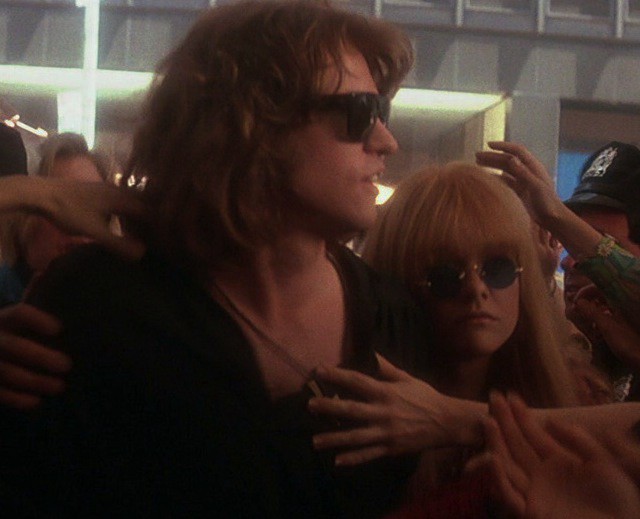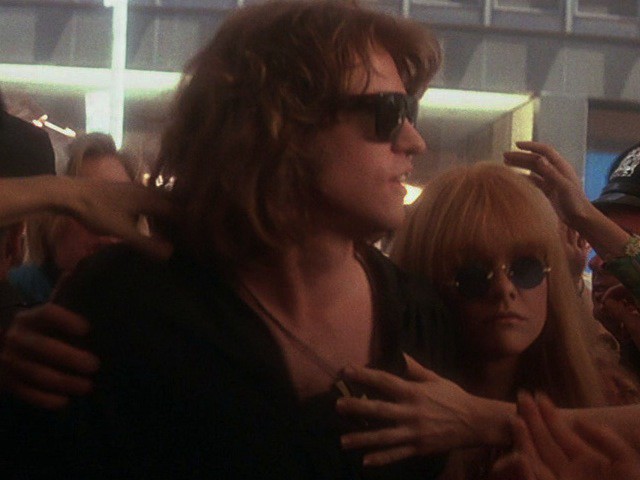Classic Rock Role-Playing Saved My Life
by Lucy Betz


I don’t think there’s any gig more depressing than that of the classic rock fangirl. You cry over your favorite band member, not only because you love them so much your heart hurts, but because there’s a good chance they joined the 27 Club decades ago; otherwise, you’re cursed with the knowledge of what your cute, 20-something crush looks like as an old person. Worst of all, you share your interests with pretty much no one…except your parents.
Classic rock was my first teenage love. In 9th grade I cut my hair like Twiggy’s, cracked jokes about Pete Best, and, when my eyesight started to deteriorate, bought round glasses like those of my ultimate crush, John Lennon. I excused his cultural appropriation, spousal abuse, and bad beards, because I thought he was misunderstood. I had it bad.
I had started attending a public school where I stood out in a bad way, and the sunny optimism of ’60s rock gave me comfort. It was reassuring to know how many people before me had felt the same way I did, and gotten through to better days. At the same time, loving The Who and The Beatles could be isolating: their heyday was 50 years before I was born. They’d had millions of fans, but by 2012 I felt like the only one left. I had never been so obsessed, or so lonely.
Because it was high school, and in high school you expect your friends to share your taste in music, I resorted to Tumblr to find company. One of my favorite blogs, run by a teenage girl who posted classic rock memes and Jane Asher makeup tutorials, posted a link to a chat room (“Come and join as a classic rock musician!”). I opened the link and started introducing myself as George Harrison.
I was excited but nervous, because my first impression was that everyone in the group was close with one another. And I did come across as sort of an intruder, but not for very long. Not only did these people share my taste, they were hilarious, cool and kind. Everyone played a classic rock character, and everyone had chosen their character for a reason.
Pamela Des Barres: A 16-year-old girl from some state down south played the famous groupie. She admired Pamela’s sexuality and musicianship. We all agreed that she was the Cool Girl of the group, which she’d joined early on. Many of us were still figuring out how to present ourselves in character, so her confidence and beauty made her an example. In the chatroom, her voice was authoritative and funny, and on the occasions she posted selfies, we were all enthralled by how much she resembled Pamela, down to the eye makeup. As the baby gay I was, she became one of my earliest girl crushes. She’d often use the chatroom as a retreat, a place to talk about her parents’ divorce and the family issues she couldn’t discuss elsewhere. Our group was also a space where we could share our social and political stances without fear: all of us were liberal feminists, and those who chose to be groupies instead of rock stars found themselves ranked equal to, if not above, their musician counterparts.
Bob Dylan: Living somewhere in Wyoming, “Bob” was a trans boy who was using the internet to express the identity he had to hide in daily life. He was impressed by Dylan’s androgyny and nonchalance: he dressed in his slim pants and Ray Bans, teased his hair and smoked cigarettes. He told us Bob’s aesthetic was masculine enough to feel comfortable, but enigmatic enough to be acceptable at home.
Keith Moon: A girl from Kentucky adored Keith’s humor and lack of restraint, even if it led to his untimely death. The comic of the group, she played pranks on a pretty regular basis (she’d sometimes swap names with someone else to confuse us) and organized raids on other chatrooms — one of her favorite online pastimes was crashing Justin Bieber groups and pretending to be Biebs.
Lori Maddox: Lori was played by a small-town lesbian girl. She had been raised very religious, and was still dedicated to her spirituality to the point where she was convinced her sexual orientation was disgusting and wrong. Playing Lori, a young groupie who had sex with both men and women, was a way to live out her sexuality vicariously, and an outlet for her frustration. She became one of my closest friends, and we talked constantly, even outside the chatroom. (We drifted apart as our tastes changed, but to this day I follow her on Tumblr.)
Jimmy Page: A cisgender boy, Jimmy had been dating Pamela in the real world for a month before we met. He once helped me with a school assignment: one night, after spending hours talking it up in the group chat, I remembered something: “Oh shit,” I typed. “Forgot I had HW.” My history teacher had assigned an essay for which we had to interview a family member about capitalism. It was two in the morning, and my family, known for going to bed before the sun even sets, was asleep. My interview with “Uncle James” earned me an A+ in history. No one was ever the wiser.
George Harrison: That was me! I revered George for his personal faith, and since he was a fellow introvert, I felt comfortable in his shoes. I still think he was the most underrated Beatle, and I’d always enjoyed his songs the most. While much of my assessment was projection, I felt like he was uniquely me, and I never felt more confident than when I was pretending to be him on the screen.
We were funny, thoughtful, and miserably lonely. The music we loved had saved us, but our obsession was niche, and the chatroom was formed out of necessity. I could talk about issues I couldn’t share elsewhere, and imagine I was getting advice from my favorite musicians instead of kids my age. I’d stay up late typing out my feelings to the others; it felt like a big sleepover. We’d get into fake drunken fights, throw imaginary parties, perform shows, act out sex — because pretty much everyone there was inexperienced, we’d fumble around clumsily, often goofing up in giggles. We were still teenagers, no matter who we pretended to be, but we were more ourselves in character.
I did eventually outgrow my obsession with classic rock, stop wearing headphones everywhere, and start making more friends at school; the others were growing up, and apart, as well. But I’d had so much fun. When the chatroom eventually dissolved, it felt like the end of an era, the way it feels when you graduate high school or leave summer camp.
I didn’t feel so isolated anymore, because I knew I had my people; I didn’t need to see them to know they were there. While I could never have a heart-to-heart with the real George Harrison or Bob Dylan, the chatroom gave me a way to thank these artists, in my own way, for enriching my life. Maybe these kids stuck in suburbia weren’t so different from John Lennon and Paul McCartney; they brought the same comfort and happiness to my life.
Lucy Betz is a teenager who edits Parallax Mag and writes for Rookie when she isn’t reading Charles Burns or watching pro-wrestling. You can find her here and here.